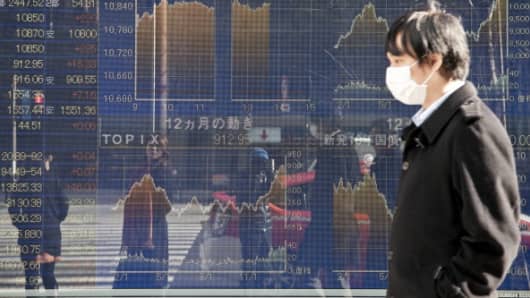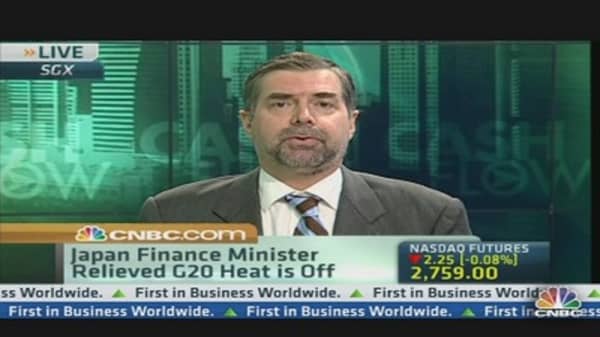As the Nikkei 225 scales a 33-month high, investors risk getting burnt as analysts warn of a correction.
The Tokyo benchmark index jumped 2 percent on Monday, helped by a weaker yen, as it continued its spectacular run-up that's notched gains of 32 percent since mid-November.
Investors have piled back into the market in response to the adoption of Prime Minister Shinzo Abe's radical economic policies – coined 'Abenomics' – which have fueled hope the world's third largest economy may be hauling itself out of a decade of stagnant economic growth.
Abe has pressured the country's central bank to adopt a more aggressive monetary policy. Last month, the Bank of Japan adopted a 2 percent inflation target and laid out plans for an open-ended asset purchase program.
But Stephen Nash, director of strategy at Sydney-based fixed income investment group FIIG Securities, said on CNBC's "Squawk Box" on Monday there's little data to suggest the economy is out of the doldrums, and he expects a sharp pullback in Japanese equities.
"Market participants have probably got themselves over-exposed and if there's no progress on growth soon, there will be a pullback. It's a matter of time before we get a correction," he said.
Last week's release of quarterly gross domestic product (GDP) figures underscores Japan's long road to recovery. The economy contracted for a third consecutive quarter over October-December, shrinking 0.1 percent from the previous quarter and missing analysts' forecast of a 0.1 percent expansion.
(Read More: Why You Should Look Past Japan's GDP Miss)
"It is good to see some strong policy action and discussion in Japan, which has been struggling with deflation for some time now," said Nash. "There's a long way to go before we get decent growth out of Japan but at some point we will see a revival. It [the stock market] is getting too built up on that."
"Even in the last 20 years which have been a long bear market [for Japan], there have been several periods of rebound, such as between 2003 and 2005 when the market rebounded by 100 percent. I would like to believe this time it is different, but I need hard evidence," he added.
Nash's comments were echoed by Eddie Tam, the chief investment officer of Central Assets Management, who said on CNBC's "Cash Flow" on Monday he was unconvinced of a genuine turnaround in the economy and questions if the rally in Japanese stocks can be sustained.




